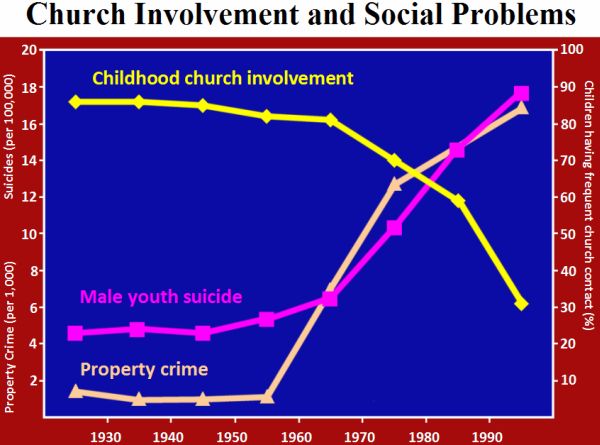Why do so many people commit suicide?
The evolution connection

It is obvious that suicide rates, particularly in young males, have escalated in the past several decades.
The causes are widely debated but the connection to evolutionary teaching would not necessarily be made by many.
But the two situations are real; as the evolution-as-fact dogma has reached saturation point in education and the public arena, so suicide has increased exponentially throughout the world.
Researchers have made the connection between religion and fewer suicide attempts1. They found that those who held to a religious affiliation—and were depressed—were less likely to kill themselves: “[The] greater moral objections to suicide and lower aggression level in religiously affiliated subjects may function as protective factors against suicide attempts.”
Conversely, they found that those who had no religious connection had fewer reasons to live and fewer moral objections to suicide.
As well, they linked anger and aggression in adolescent boys with suicidal behaviour in later life.
We get a hint of how secular humanists view the results of such research: “Indeed, compassionate tolerance for suicide and euthenasia [sic] are widely regarded as hallmarks of many secular societies.”2 Why wouldn’t they be, from an evolutionary you’re-just-a-bag-of-chemicals paradigm?
Rather, it underscores that the relationship between evolutionary teaching, atheism and suicide is real, as creationists have long pointed out.
In an Australian Broadcasting Commission (ABC) program3 that discussed depression, a man named Gerard raised the connection between evolution and suicide.
He spoke of having contemplated suicide several times.
He said: “I’m just a bit concerned by the tendency of the medical profession and society in general to want to put a label on us as depressive people and therefore that there’s something wrong with us. I think that some people may have an inability to cope, and maybe this might sound a bit extreme, but that might be Darwinian theory, the Darwin theory of survival of the fittest. Maybe some of us aren’t meant to survive, maybe some of us are meant to kill ourselves because the only people that really suffer are the ones left behind, but the person who kills themself may in fact be liberated from this body.”
Clearly, there are complex factors involved in many suicides, including the very real phenomenon of clinical depression. But not only is there a rising rate of depression in our increasingly post-Christian Western culture, it makes sense that there is also a greater likelihood of a depressed person taking the exit route of death if life has no ultimate meaning, which is the logical corollary of evolution (a world that made itself). What would it ultimately matter, if we are all just reorganized pond scum destined to be, at best, recycled as fertilizer, with neither hope beyond the grave, nor any accountability to our Maker?

Police investigating the recent Colorado shooting-range death of 29-year-old Kristin Hermeler and the simultaneous attempted suicide of her twin sister Candice, report that the twins had “an unusual interest” in the 1999 massacre at the nearby Columbine High School.4 And among the twins’ belongings the police found a copy of The God Delusion by outspoken atheist Richard Dawkins.
Atheism is existentially unfulfilling. As we summarise elsewhere:
Atheism is a journey without a destination, a body without a soul, a religion without reason, life without meaning, a faith without hope, and a universe without God.5
Sigmund Freud concluded, “The moment a man questions the meaning and value of life, he is sick, since objectively neither has any existence.”6
It’s true that believers and non-believers alike get angry and depressed but it doesn’t need to lead to suicide, as the research survey shows.
In contrast to the purposelessness of evolution, those who call the Lord Jesus Christ their personal saviour have a purpose for living—they know they are “fearfully and wonderfully made”.7
References
- Dervic, K., et al., ‘Religious Affiliation and Suicide Attempt’, accessed from ajp.psychiatryonline.org on 14 Nov 2012. Return to text.
- “Religious Affiliation, Atheism and Suicide”, access from adherents.com/misc/religion_suicide.html on 14 Nov 2012. Return to text.
- ABC (Australia) radio, Life Matters with Norman Swan, 4 May 2000: “Black Dog Days—The Experience and Treatment of Depression”; Wieland, C., Darwin, Spurgeon and the Black Dog , Creation 22(4):54–55, creation.com/suicide. Return to text.
- Catchpoole, D., Creation 22(1): 17, creation.com/bomb. Return to text.
- Kumar, S., Sarfati. J., Christianity for Skeptics, 2012, Creation Book Publishers, Atlanta, Georgia, USA. p89. Return to text.
- Ibid. Return to text.
- Psalm 139:14. Return to text.




Readers’ comments
Comments are automatically closed 14 days after publication.